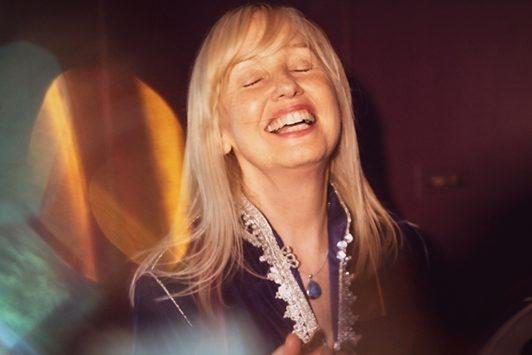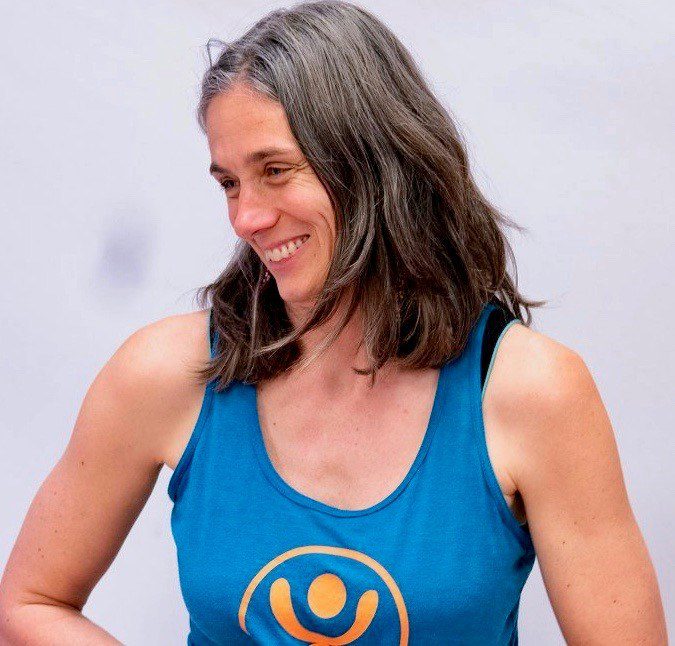Thank you so much for taking the time to meet with us to chat about your experiences of the Meditation Teacher Training Course.
Can you share a bit about your background and what inspired you to enroll in the Yogacampus Meditation Teacher Training course?
My background is in education, I taught children with profound learning difficulties for many years. I made the decision to stop teaching after developing Long Covid. I have practised yoga for over twenty years and did a teacher training about ten years ago but was still teaching in school full time so didn’t really do much yoga teaching. I completed another teacher training with Naomi Annand at Yoga on the Lane in 2022 and started teaching classes in Stroud, where I live, and online.
I have a particular interest in community yoga with others that is accessible to anyone who would like to practice together, so I was really pleased to be able to do the Accessible Yoga Teacher Training course. I now teach some chair-based yoga, mainly to older people as well as classes at the local leisure centre and at local community hubs. As part of my yoga practice I have attempted to build a regular meditation practice over the years but it never really happened! When I was working in schools I was very stressed a lot of the time and despite my regular yoga practice my nervous system was pretty dysregulated. Whilst recovering from long Covid I had to learn how to slow down, how to manage my energy and begin to regulate my nervous system. This is a work in progress!
Over the past year or so I have become more and more interested in meditation. I made a conscious decision to try and develop a consistent meditation practice and felt that this would be more achievable in community with others. I set up an online session for anyone to come along and practice together, unguided and free of charge. In the end it has mainly been me and one other person and we meet most mornings during the week. We do our own practice and have a chat about it afterwards and it has been immensely supportive. As I began to practise regularly I really did start to feel the benefits and can now feel a tangible difference in my nervous system. I have felt increasingly drawn to incorporating meditation into my yoga classes and wanted to learn more about it to inform my teaching. I started looking for meditation teacher training courses and discovered the Yogacampus one. The teachers were recommended to me by another experienced yoga teacher whose opinion I value.
How was your experience with the Meditation Teacher Training Course?
I thought the course was excellent from start to finish. The teachers are very well-informed but what I thought they were both particularly successful at was making the content accessible. They were able to relay a lot of information in a way that was easy to understand and digest. The course was well structured with a good mix of information and interaction and the focus on starting teaching from the beginning means you get to start applying the theory in practice straight away so it becomes more meaningful.
The course emphasises practical teaching from early on. How did this hands-on approach help you in developing your skills and confidence as a meditation teacher?
The information we were given and the practical teaching elements were developed carefully so I didn’t feel intimidated by the idea of teaching at any point. We were given information and theory and then had the chance to put it into practice. Isabell and Graham also modelled practices and approaches for us throughout as well so we had the experience of practising the things we were teaching.
What aspects of the Yogacampus course do you find unique or particularly beneficial compared to other meditation training programmes?
I haven’t experienced any other meditation training so it is hard to compare but I particularly liked the way we learnt about meditation in different traditions. We were taught about the historical development of meditation practices in yogic and Buddhist traditions and also how these practices have been incorporated into modern mindfulness. I felt that this provided a comprehensive background for the practical teaching tools we learned alongside it.
In what ways has the course contributed to your personal growth and transformation?
I had a few mini lightbulb moments! As part of the course we were asked to keep a diary reflecting on our meditation practice and then at the end write a reflection on this. As I read back on mine, looking for emerging themes, I realised that I found I enjoyed the experience of meditation most when I wasn’t striving to use a particular technique. When I let go of my attachment to maintaining my focus on a pre-determined approach and noticed what was happening at that moment and responded to that. I thought this was interesting as I am often striving in my daily life and have struggled with managing expectations and attachment to things being a certain way. It was impactful for me to recognise that in my meditation practice letting go of attachment to things being a certain way was beneficial. Now to apply that to my daily life!
The course covers a wide range of meditation practices. How did this diversity enhance your understanding and practise of meditation?
It was really useful for me to learn about different meditation practices, the distinctions between them, and the way they overlap and can be used collaboratively within a practice. Developing my understanding of different approaches really supported me to be able to let go of attachment to specific techniques because I felt like I was able to explore what came up in an informed way.
As a yoga teacher, how did the course equip you to seamlessly integrate meditation into your yoga classes? Are you running meditation classes now?
I have always taught a ‘mindful’ approach to yoga, as to me, this is yoga! I recognise that meditation is part of a yoga practice and not distinct from it so it feels natural to incorporate more of the techniques I’ve learnt into my classes. I haven’t yet started any stand-alone meditation classes but I do intend to in the new year. It is my feeling that there are particular benefits to a stand-alone meditation practice. I feel I have learned things about myself through a regular meditation practice that I managed to avoid during years of more asanas-based practices. I believe that I personally and actually the world generally, benefits from making time to be still. I absolutely know, from my own experience, that this is incredibly challenging for many people and I would like to find a way of making stillness and quiet feel more accessible to others.
What advice would you give to someone considering enrolling in the Yogacampus Meditation Teacher Training course?
I highly recommend the course. It is intellectually and philosophically interesting but in a very accessible way. The teachers are very supportive. There is a lot to do, but it is well structured and I found it achievable alongside work and family life.
How has completing the course impacted your career as a teacher?
I look forward to seeing how the course impacts my teaching. I am really excited to talk to my current students more about ways in which I might offer meditation to them and hopefully others as well. I am very interested in social and climate justice and yoga and meditation inform my activism. At the end of the course Graham said “the world needs more people meditating right now” and I completely agree. I hope to explore meditation as a way of developing a more compassionate, slower and gentle way of living.
Any final thoughts or insights you'd like to share with our readers, especially for those who might be on the fence about joining the course?
I think if you are able to, you really won’t regret joining this course. It is a really accessible, interesting, and carefully structured course, and, having completed it, I feel well-equipped to develop both my personal meditation practice and my teaching.
Thank you, Isabelle and Graham!

Upcoming Courses

FREE online webinar: Sound Bath
2nd March 2026 • Online Live Anne Malone
- Details and booking

Embodied Relax and Restore: The Mind of Restorative Yoga
9th September 2026 • Online Live Adelene Cheong
- Details and booking

Embodied Relax and Restore: Pratyahara
8th July 2026 • Online Live Adelene Cheong
- Details and booking

Embodied Relax and Restore: Somatic Restoration
10th June 2026 • Online Live Adelene Cheong
- Details and booking

Embodied Relax and Restore: Being Restorative Yoga
7th October 2026 • Online Live Adelene Cheong
- Details and booking

Embodied Relax and Restore: Cellular Restoration
13th May 2026 • Online Live Adelene Cheong
- Details and booking

Birthlight: Yoga for Optimal Pelvic Floor Tone through Women's Lifecycles
7th March 2026 • Online Live Kirsteen Ruffell
- Details and booking

Nervous System Nourishment for Women: Daily Practices From Yoga, Ayurveda & Traditional Chinese Medicine
4th March 2026 • Online Live • Surya Little Dr. Margo Bachman
- Details and booking

Discover Relief and Rejuvenation with SATYA: An Online Workshop to Enhance Your Well Being with Somatic Awareness
25th March 2026 • Online Live Tias Little
- Details and booking

The Psoas and the Koshas: Bridging Anatomy and the Subtle Body
23rd March 2026 • Online Live Leila Stuart
- Details and booking
